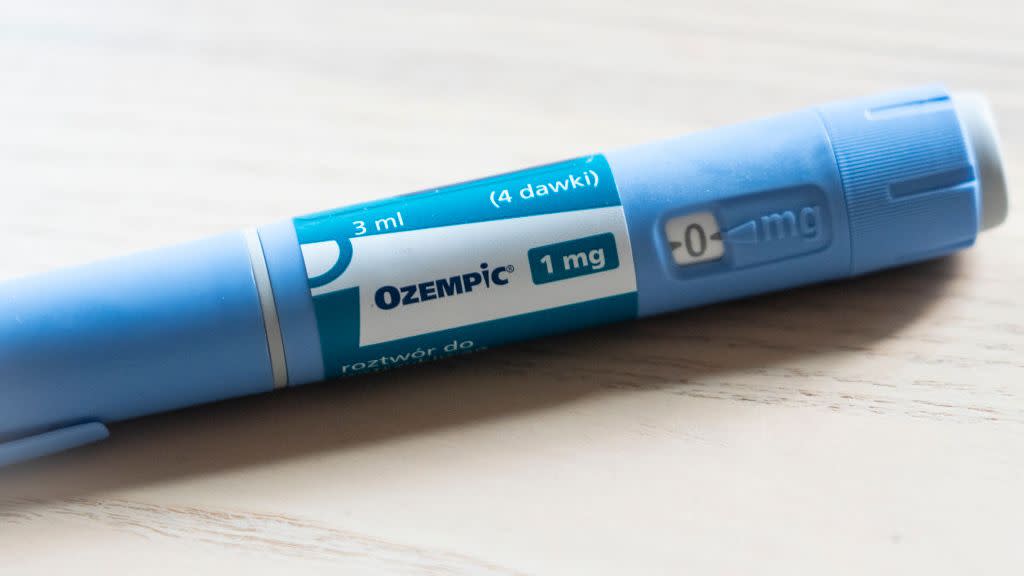Fiber Might Be Your New Best Friend If You’re Taking Ozempic

If you've been taking semaglutide weight-loss drugs like Ozempic, it's possible you've also found yourself at an impasse at times, thanks to rough side effects like constipation, diarrhea, and gastrointestinal upset. While your doctor will likely give you personalized gut-health guidance, there are a few other simple steps you can take to reduce your discomfort (and time spent on the commode), and experts say adding fiber into your diet is a great place to start.
Of course, not everyone experiences gastrointestinal side effects while taking the medications, and they do tend to get better after a few weeks, says Mir Ali, MD, medical director of MemorialCare Surgical Weight Loss Center at Orange Coast Medical Center in Fountain Valley, Calif. Still, for people taking Ozempic and similar weight-loss meds, it makes sense to try to manage these pesky symptoms or prevent them from occurring in the first place.
So, here's everything to know about how fiber works in the body while you're on Ozempic, and how to best use fiber supplements to quell some of those groan-inducing symptoms, according to weight-loss doctors and a registered dietitian nutritionist.
Meet the experts: Mir Ali, MD, is the medical director of MemorialCare Surgical Weight Loss Center at Orange Coast Medical Center in Fountain Valley, Calif. Scott Keatley, RDN, is the co-owner of Keatley Medical Nutrition Therapy. Michelle Cardel, PhD, RD, head of global clinical research and nutrition at WeightWatchers. Dina Peralta-Reich, MD, is the director of New York Weight Wellness Medicine.
Can I take fiber while I'm on Ozempic?
Yes, you can take a fiber supplement when you’re taking Ozempic, a medication for people with type 2 diabetes that can be prescribed off-label for rapid weight loss.
“It will not get in the way of how the semaglutide is supposed to function,” says Scott Keatley, RDN, co-owner of Keatley Medical Nutrition Therapy.
In fact, incorporating fiber into your diet is always important, but becomes especially essential while you're taking a weight management medication like semaglutide, adds Michelle Cardel, PhD, RD, head of global clinical research and nutrition at WeightWatchers.
What side effects can fiber help with?
To understand the Ozempic side effects fiber might be able to help with, it’s important to understand how the medication works in the body.
Ozempic is an injectable medication that mimics a protein in your body called glucagon-like peptide 1 (GLP-1). This protein does a few things, including increasing the production of the insulin, a hormone that helps escort blood sugar into your cells, where it can be used for energy. It also makes you feel less hungry and delays the movement of food from your stomach to the small intestines, where nutrients are absorbed, Ali explains.
But if food is moving more slowly through your gut, that also raises your risk of constipation, Keatley explains. And this is the main side effect that fiber can help address.
Adding soluble fiber to your diet in supplement form can be especially helpful in keeping the stool soft and helping it hold more water, Keatley says. "So, even with the delay [of movement of food in your gut], it won’t become too dry to pass.”
Cardel agrees that both soluble and insoluble fiber can help prevent you from getting stopped up. (Soluble fiber pulls food through your digestive system, and insoluble fiber which makes stool easier to pass and reduces constipation).
"Both types of fiber are essential for maintaining regularity and digestive health," she explains.
Unfortunately, fiber won’t help with nausea if you happen to experience it while taking Ozempic and other semaglutide meds, Ali says.
How much fiber can I take with Ozempic?
While Ali says that there’s “no exact limit, per se,” on how much fiber you can have when you’re on Ozempic, he suggests sticking with the daily recommended intake, which is 25 grams a day for women and 38 grams a day for men.
But Keatley recommends getting your fiber from supplements and food, suggesting that you should really only take up to nine grams of fiber in supplement form when you’re on Ozempic.
What are the best ways to supplement fiber intake?
If you can, experts recommend trying to get fiber from your food before turning to a supplement. “This fiber should come from food because that is your greatest source of non-soluble fiber, which helps keep the speed of your food moving through the gut up,” Keatley says.
If you decide to add a fiber supplement to your diet, Ali suggests taking a supp you can swallow with water, like Metamucil and Benefiber.
You should also introduce the added fiber slowly. “Too much at one time can cause more gastrointestinal distress than it solves,” Keatley says.
Instead, Keatley suggests starting with three grams of fiber that you take with eight or 16 ounces of liquid, giving your gut about 10 days to get used to this new dietary addition. Then, add another three grams and follow the same timeline until you hit at a maximum of nine grams.
Finally, Keatley doesn’t recommend taking your fiber supplements at the same time you eat meals or take oral medication. “The fiber can get in the way of absorption of nutrients and medications,” he says. (If you can, Keatley suggests waiting one to two hours between.)
If you're adding in fiber, you need to drink lots of water.
“If you don’t get enough water when you take a fiber supplement, it can bind you up more," creating worse constipation, Ali says.
Other experts agree. “Water is key,” Dina Peralta-Reich, MD, director of New York Weight Wellness Medicine, says. “When my patients are on semaglutide, I recommend having a minimum of two to three liters of water a day.”
Overall, experts say that taking fiber while on Ozempic can be helpful. “If you can’t get enough fiber from your diet, there’s no harm in taking a supplement,” Ali says.
You Might Also Like


